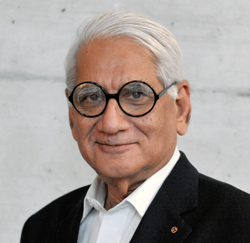
To the death of Charles Correa
 |
After starting at the University of Bombay, he continued his studies at MIT in Cambridge (1953-55). In 1958, he opened his own practice in Bombay. He gained wider attention in 1961 with his Hindustan Lever pavilion for the international exhibition in Delhi, which reflected the influence of Le Corbusier's pavilion for Expo'58, but Correa advanced his design in both material and structural aspects, potentially influencing later generations of architects. However, Correa's work is so distinctive that it is difficult to classify it within the architectural movements of the 20th century, and it always relates better to Indian traditions. In 1965, he designed a museum for Mahatma Gandhi and subsequently the National Museum of Crafts in New Delhi (1975-90), which aims to adapt spatial arrangements as best as possible to the local climate. One of the most important sources of inspiration for Correa was the method of "approaching one's surroundings." He was one of the first representatives of critical regionalism, to which leading theorist Kenneth Frampton dedicated his monograph in 1997.
From 1970-75, he was the chief architect of the two-million port metropolis, New Bombay. In 1984, he founded the Urban Design Research Institute in Bombay, and in 1985, he was appointed chairman of the National Commission for Urbanization by the Indian Prime Minister.
In addition to numerous professional awards (Aga Khan Award for Architecture 1998, Praemium Imperiale 1994, Royal Gold Medal RIBA 1984), he also received the highest government honors (Gomant Vibhushan 2011, Padma Vibhushan 2006, Padma Shri 1972).
In recent decades, he had the opportunity to realize his projects around the world. His work effortlessly permeates environments tied to traditions, connecting Western and Eastern ways of thinking, yet they have never become global. Creators like Correa are needed more than ever today.
Charles Correa passed away on June 16, 2015, at home in Bombay at the age of 84 after a brief illness.
More information >
The English translation is powered by AI tool. Switch to Czech to view the original text source.
0 comments
add comment











